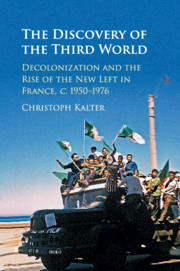Book contents
- Frontmatter
- Contents
- List of Figures
- Preface
- Acknowledgments
- Abbreviations
- 1 Introduction: From “Discovery” to Historiography
- 2 A New Concept of the World: The Third World in the Social Sciences and Politics
- 3 Conflicts, New Diversity, and Convergence: The New Radical Left in France
- 4 “From the Résistance to Anticolonialism”: The Politics of Memory in the New Radical Left
- 5 “Today We Have to Learn a Lesson from Them”: The Journal Partisans and the Opening Up to the Third World
- 6 “With Socialist Greetings”: The PSU, the Cedetim, and the Praxis of “International Solidarity”
- 7 Conclusion: Eyes on the World
- Appendix
- Bibliography
- Index
2 - A New Concept of the World: The Third World in the Social Sciences and Politics
Published online by Cambridge University Press: 05 September 2016
- Frontmatter
- Contents
- List of Figures
- Preface
- Acknowledgments
- Abbreviations
- 1 Introduction: From “Discovery” to Historiography
- 2 A New Concept of the World: The Third World in the Social Sciences and Politics
- 3 Conflicts, New Diversity, and Convergence: The New Radical Left in France
- 4 “From the Résistance to Anticolonialism”: The Politics of Memory in the New Radical Left
- 5 “Today We Have to Learn a Lesson from Them”: The Journal Partisans and the Opening Up to the Third World
- 6 “With Socialist Greetings”: The PSU, the Cedetim, and the Praxis of “International Solidarity”
- 7 Conclusion: Eyes on the World
- Appendix
- Bibliography
- Index
Summary
Does the “Third World” in fact still exist? It certainly does on Google: a search of “Dritte Welt” in February 2015 yielded 457,000 results, “tiers monde” produced 639,000, and “Third World” no fewer than 25.1 million. Some of these results associate the term solely with the bygone era of the Cold War; others, however, treat the Third World not as history, but as a present-day reality. Following up on some of these results quickly reveals the semantic fields associated with the Third World: it stands for poverty, hunger, disease, natural catastrophes and refugees, for ethnic conflicts, religious fundamentalism, corruption, failed states, and terrorism. It strikes many as deficient technologically, economically, socially, politically, and culturally, and thus as in need of appropriate “development.” Corporations, governments, supranational organizations, and NGOs are active in the Third World. It still is a subject of mass media, a field of politics, and a battle cry. The Third World is seen as needy or dangerous; at the same time, it stands for the self-empowerment of “new” actors, for more democratic participation, for grassroots globalization, and for hope in a just world (economy). Its locus is not easy to pinpoint: Is it found in Africa, Asia, and Latin America? Or only in parts of those continents? Or in the “global South”? Is it also located in the “global North,” or simply in “the one world”? In any case, talk about the Third World can no longer do without reference to “globalization.” To sum up: the meaning of the concept is elastic, disparate, even contradictory. Nevertheless – or for that very reason? – it would appear that the Third World is still part of contemporary everyday language.
Does the Third World still exist, then? If one looks at the discussion in the social sciences, the answer is more doubtful. In 2004, an academic journal asserted that the end of the Third World had been proclaimed for twenty years – but also that the claim had been refuted time and again. In fact, the editor of the journal had placed a question mark behind the title, “After the Third World?,” and every other essay pleaded for retaining the concept. To be sure, the authors could marshal good arguments for their positions.
- Type
- Chapter
- Information
- The Discovery of the Third WorldDecolonisation and the Rise of the New Left in France, c.1950–1976, pp. 34 - 65Publisher: Cambridge University PressPrint publication year: 2016



